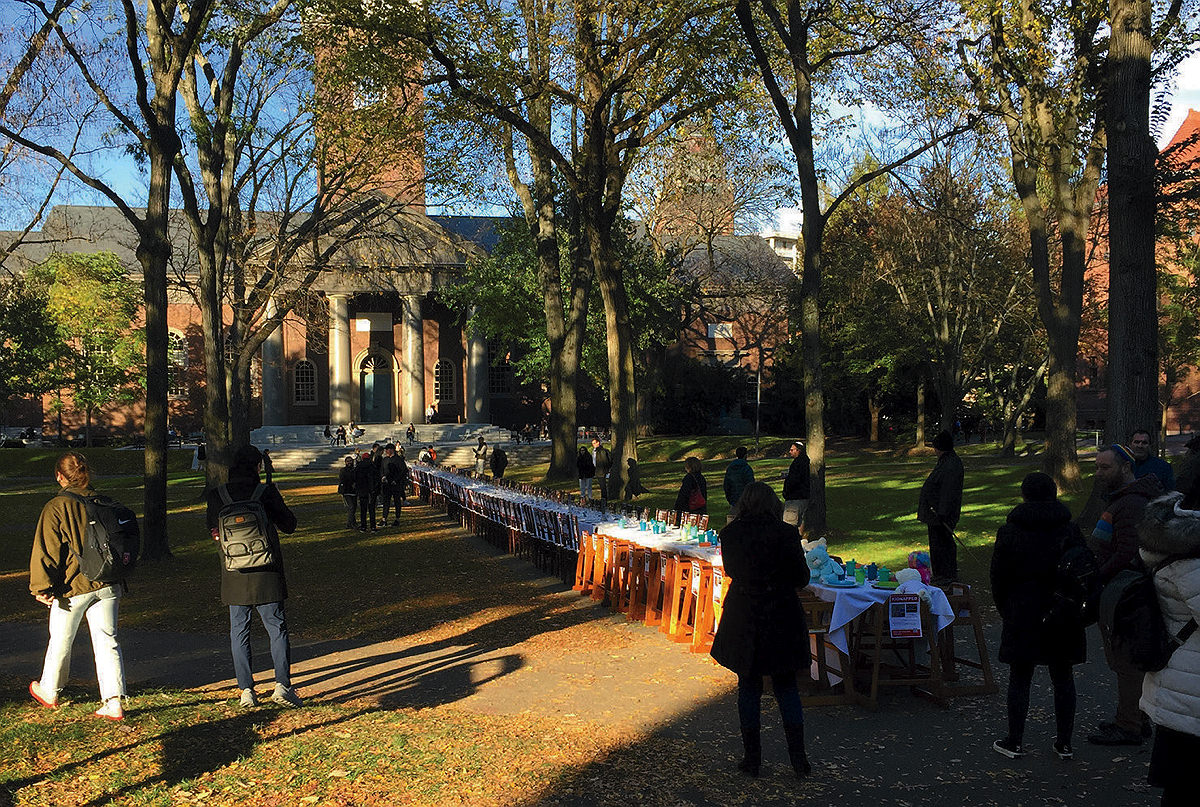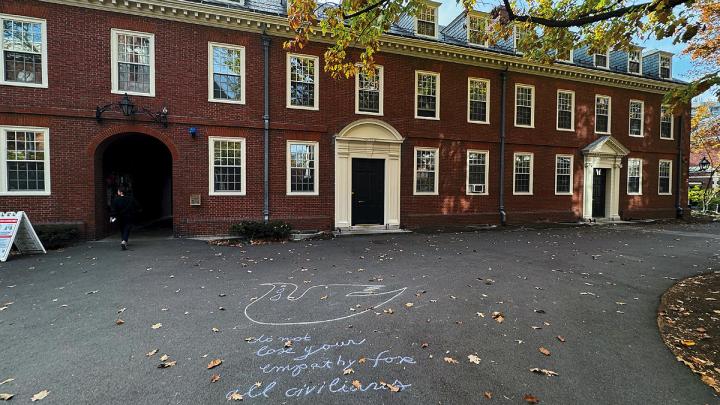Hamas’s terrorist assault on Israel on October 7—murdering more than 1,200 people, principally civilians, and kidnapping more than 200 who were taken to Gaza as hostages—set off furious confrontations at Harvard and on campuses across the country. As the Israel Defense Forces began bombing Hamas targets embedded among Gaza’s people and then pressing their intense attack on the ground, civilian casualties mounted, and campus tensions intensified, sometimes tinged with deplorable strains of antisemitism and Islamophobia. Here and nationwide, local conversations were amplified as alumni and former University officials publicly excoriated campus supporters of Hamas and Palestinians and blasted academic leaders for the perceived inadequacy of their statements on antisemitism. External advocacy groups even doxxed students from trucks in Harvard Square. In short, as the war brutally bloodied the Middle East—with perhaps far worse to come—the emotions unleashed echoed in raw ways within the academy, and subjected colleges and universities to outside pressures that threaten to constrain their ability to foster productive conversations.
This brief account of Harvard developments, compiled before Thanksgiving to meet production deadlines, necessarily risks becoming outdated by the course of the war and reactions to it.
—The Editors
It is not news that many Harvard students, and those on other campuses, are sympathetic to Palestinians. Across the country and in many other nations, survey research indicates that younger people tend to be favorable to Palestinians (much more so than older people, who are more favorably disposed to Israelis). The Economist reported in November that that skew is even more pronounced among U.S. and British social-media users, who tend to be predominantly young. So it was not unprecedented that during breaks between speakers at this year’s convocation, on September 4, organized groups broke in with cheers advocating Palestinian rights (see harvardmag.com/convocation-23).

That predisposition, readiness to resort to social media, and perhaps other motives resulted in a letter on Saturday afternoon, October 7, signed by more than 30 University student organizations, that held “the Israeli regime entirely responsible for all unfolding violence.” Its unilateralism and seeming indifference to Hamas’s butchery immediately poisoned campus discourse and polarized reactions far beyond.
In response, more than 3,000 University affiliates signed a statement spearheaded by Harvard’s Hillel and Chabad, which called the letter “completely wrong and deeply offensive.” The statement encouraged Harvard’s administration to condemn Hamas’s attacks. “Failure to denounce these atrocities unequivocally,” it continued, “is a moral stain on the University and its leadership.” Sunday evening, the Crimson reported, President Claudine Gay and Provost Alan M. Garber attended a Hillel dinner, and Faculty of Arts and Sciences and College leaders appeared at a student vigil outside Widener Library later that night.
On Monday, before any University statement, former president Lawrence H. Summers, now Eliot University Professor, declared, “In nearly 50 years of Harvard affiliation, I have never been as disillusioned and alienated as I am today.” Writing on the X platform, he said, “The silence from Harvard’s leadership, so far, coupled with a vocal and widely reported student groups’ statement blaming Israel solely, has allowed Harvard to appear at best neutral towards acts of terror against the Jewish state of Israel.”
That evening, Gay and Harvard’s deans disseminated an email that said in part, “We write to you today heartbroken by the death and destruction unleashed by the attack by Hamas that targeted citizens in Israel this weekend, and by the war in Israel and Gaza now under way.” Harvard, they continued, would support students affected by the war, and “take steps that will draw on our common humanity and shared values to modulate…the deep-seated divisions and animosities so distressingly evident in the wider world.”
After Summers and others assailed the statement for failing to explicitly criticize Hamas or comment on (or repudiate) the student letter, Gay issued a second statement on October 10, writing that “I condemn the terrorist atrocities perpetrated by Hamas. Such inhumanity is abhorrent….” She also noted that “while our students have the right to speak for themselves, no student group…speaks for Harvard University or its leadership.” A letter signed by more than 100 faculty members circulated that day, criticizing the University’s initial response for creating a “false equivalency” between the terror attack and Israel’s response in defense.
In the wider arena, Accuracy in Media deployed trucks to Harvard Square, displaying pictures of students affiliated with groups that signed the October 7 statement, identifying their personal information, and labeling them “Harvard’s Leading Antisemites.” (A similar stunt at Columbia University has prompted a defamation lawsuit from a student who was no longer a member of the group at the time it issued its statement.) Such doxxing efforts led to online assaults on students and their families—a level of discomfort heightened when alumnus Bill Ackman ’88, M.B.A. ’92, and former faculty member Alan Dershowitz (famous for his legal defense of highly unpopular clients) called for the pro-Palestinian students to be identified so they could be denied future employment. U.S. Senator Tom Cotton ’99, J.D. ’02, outdid other political figures in labeling Hamas-supporting foreign students “fifth-columnists” and calling for their deportation.
Some student groups withdrew from the October 7 statement, and the names of all the affiliated groups were then removed for their safety—and an October 12 follow-up statement said the sponsoring groups “staunchly” oppose “all violence against all innocent life….” Summers suggested that people “take a deep breath” and refrain from vilifying every student affiliated with a group that signed the October 7 statement, noting the haste with which it was issued and the likelihood that they were not consulted on, or fully aware of, what they were signing. Out of public view, faculty deans, House staff, and others provided support to students who felt threatened.
In an October 13 video message, Gay sought to de-escalate the rhetoric. She defended free expression but noted explicitly that doing so “is a far cry from endorsing” contested ideas. She rejected terrorism, including “the barbaric atrocities perpetrated by Hamas.” On October 27, at the Shabbat dinner at Hillel, Gay said, “The past few weeks have been full of darkness.” Citing the “resurgence of bigotry,” she said, “Antisemitism has no place at Harvard.” She cited the University’s “very long and shameful history” of antisemitism, at the core of which “is a lie.” Accordingly, she announced a group of advisers to frame “an agenda and strategy for combating antisemitism at Harvard.”
President Gay reminded the community that “No one at Harvard has the right to threaten or endanger others, under any circumstance.”
On Friday evening, November 3, Gay dispatched another missive, reminding community members of the University-Wide Statement on Rights and Responsibilities and its foundational commitment to “protect[ing] free expression, while articulating the special duties we owe one another….It recognizes that unfettered rights, absent responsibility, tend toward chaos.” The basic principle, she wrote, is that “Protest and dissent have an honored place here, but not behavior that infringes on the physical safety and security of others. No one at Harvard has the right to threaten or endanger others, under any circumstance.”
A nearly simultaneous message from executive vice president Meredith Weenick (amplifying one she sent October 11), with a subject line about “safety and well-being resources,” pointed at the underlying concerns. “We’ve seen an increase in hateful and reckless rhetoric,” she wrote. “We’ve seen individuals within our community targeted by acts of harassment and intimidation. I want to assure you that we do not condone and will not ignore acts of harassment or intimidation, or threats of violence.” She then detailed ways to get help in cases of threats to physical safety or online harassment, or for anyone requiring mental health support. As serious as those matters were, Harvard community members’ self-restraint (and perhaps efforts by the institution) appeared to spare the University from the most threatening protests or physical confrontations reported at numerous other schools.
At the November 7 Faculty of Arts and Sciences meeting, where Dean Hopi Hoekstra thanked the many staff who were supporting students, two faculty members—both of whom acknowledged the hideous history of antisemitism—rose to question Gay’s initiative: its definition of antisemitism, implications for campus speech, and apparent inattention to Muslim students on the receiving end of Islamophobic bigotry.
Two days later, a further Gay message, “Combating Antisemitism,” detailed her advisory group and its mission and spelled out anew the resources available to protect community members’ safety and well-being in the context of the University’s larger programs on equity, diversity, inclusion, and belonging, and existing policies on harassment and bullying. More broadly, Gay wrote, “We do not condone—and will not ignore—antisemitism, Islamophobia, acts of harassment or intimidation, or threats of violence”—including an October 18 incident at Harvard Business School during a protest, which she said was under investigation. Turning to free speech, she took the unusual step of singling out a phrase that has come to be associated with eliminationist Hamas rhetoric:
We are at our strongest when we commit to open inquiry and freedom of expression….At the same time, our community must understand that phrases such as “from the river to the sea” bear specific historical meanings that to a great many people imply the eradication of Jews from Israel and engender both pain and existential fears within our Jewish community. I condemn this phrase and any similarly hurtful phrases.
Gay’s message and her decision to address that language in turn prompted a critical faculty letter expressing grave concern over “pressure from donors, alumni, and even some on this campus to silence faculty, students, and staff critical of the actions of the State of Israel.” “There should surely be limits to what is speakable, even in a university,” the letter continued. “Saying things that are plainly untrue—denying the Holocaust, for example—merits condemnation.” But “There must…be room on a university campus for debate about the actions of states, including of the State of Israel. It cannot be ruled as ipso facto antisemitic to question the actions of this particular ethno-nationalist government any more than it would be ipso facto racist to question the actions of Robert Mugabe’s ethno-nationalist government in Zimbabwe.” The signers called on Gay to resist decertifying student groups, to reaffirm Harvard’s “commitment to the freedom of thought, inquiry, and expression,” and to form a parallel “advisory group on Islamophobia and anti-Palestinian and anti-Arab racism.”
Whether others abhorred or endorsed these views, the exchanges represented progress of a sort: reasoned expression on differing points of view. That alone suggested that Harvard retained some of its core capacities.
The student experience may differ. On the afternoon of November 3, Harvard Hillel and Harvard Chabad students assembled a Shabbat table extending from near the Widener Library steps toward Memorial Church, each chair—even the children’s high chairs—bearing a flier about a kidnapped Israeli held hostage by Hamas. Four days later, at Widener at dusk, a smaller group of students, with handmade banners denouncing the continued bombing of Gaza, read the names—and, wrenchingly, the ages—of children who had died as a result.
Separate days, separate advocates, and assuredly separate perspectives on the initial terrorism and Israel’s response: the two sides were not nearly in conversation with one another. Neither were they confronting or interrupting each other. Even though dialogue seemed a long way off in the autumn darkness, the Harvard community contained multiple viewpoints on the continuing catastrophe. A small thing, perhaps, but the necessary condition for some future conversation.
Read more at harvardmag.com/respond-israel-23 and, on President Gay’s antisemitism advisory committee and the faculty letter reacting to it and other aspects of speech, harvardmag.com/faculty-expression-23.








